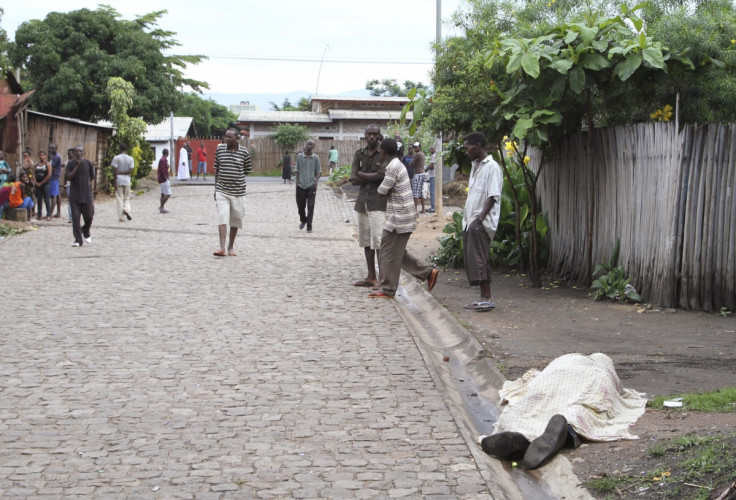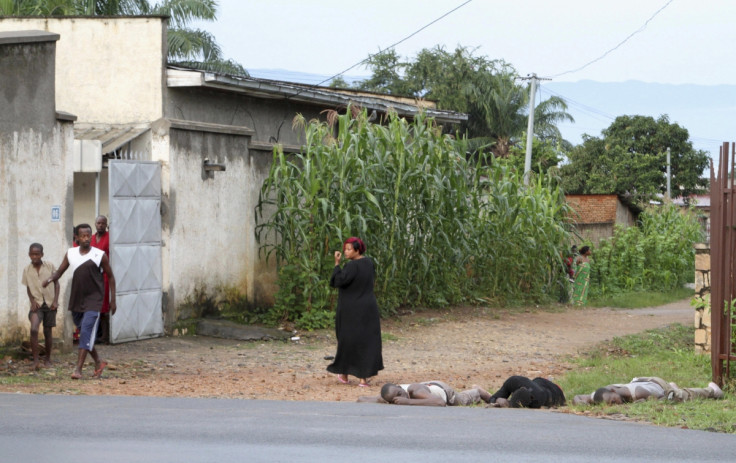Burundi: UN says nation's on verge of civil war after over 400 killings

At least 400 people have been killed and almost 3,500 have been arrested in Burundi, a nation on the brink of a civil war, according to the United Nations. Zeid Ra'ad Al Hussein, the United Nations (UN) high commissioner for human rights said on Thursday (17 December) that the country was on the verge of civil war because of a campaign of political repression and violent unrest that killed 400 people and perhaps considerably more.
Burundi's deadly violence erupted after President Pierre Nkurunziza announced a controversial run for a third term, which he won in contested elections in July. Opposition said he was violating the constitution's two-term limit as well as the Arusha agreement that ended Burundi's 12-year civil war in 2005.
Until now, battle-lines in the crisis have followed the political divide, but many fear prolonged violence could reopen old ethnic rifts. Burundi's 1993-2005 civil war pitted rebels of the Hutu majority − including one led by Nkurunziza − against what was then an army led by the Tutsi minority.
No international community action
"Burundi is at bursting point, on the very cusp of a civil war," Al Hussein told a special session of the UN Human Rights Council, as he called for a robust response by the international community, including travel bans and asset freezes.
On 12 November, the UN Security Council (UNSC) unanimously approved a resolution strongly condemning the surge in killings, torture and human rights violations in the small nation and threatened to impose sanctions against those contributing to the violence.
The resolution proposes to reinforce the UN's "presence" in the country, which means the UN's peacekeeping contingent, the Blue Helmets, could be deployed to appease the violence.

The proposal also asks secretary-general Ban Ki-moon to deploy a team to Burundi to work with the government, African Union and other partners to "develop options to address political and security concerns", and calls for an "urgent" dialogue between the ruling power and the opposition.
The Council for the Observance of the Constitution, Human Rights and the Arusha Peace Accord (Cnared), an alliance-in-exile of several opposition movements, welcomed the UNSC's adoption of the resolution, but said it was still too "minimal".
Warnings of a 'genocide'
A spokesman for the Cnared, meanwhile, echoed warnings that a "genocide" may be underway.
"Help us, the world needs to know that the genocide is underway,"Jeremie Minani told IBTimes UK, following the death of nearly 90 people during clashes in the capital on 11 December.
"There is an emergency for the international community to act and take measures to protect the civilian population. The world needs to understand there absolutely is a genocide underway in Burundi, against a part of the population who is opposed to the third term, and there is an ethnic element to it," Minani said, highlighting the lack of action from the international community.
Explaining that a "genocide" is underway in the country from which more than 220,000 have fled, Minani claimed the situation is a stark reminder of that of Rwanda in 1993-1994, when between 800,000 and 1 million Tutsis and moderate Hutus were slaughtered.
Can Uganda lead mediating talks?
A Burundian civil society leader, meanwhile, questioned whether Uganda should continue to host stalled mediating talks between Burundi's ruling CNDD-FDD party and opposition groups.
The civil society leader, who is close to the talks, is questioning Uganda's ability to carry out its role as mediator after its minister of defence Crispus Kiyonga was this summer appointed by Uganda's President Yoweri Museveni as lead mediator to drive the peace efforts for the East African Community (EAC). In June, Nkurunziza agreed to discuss the issue surrounding his third-term mandate.
According to the leader, who asked for anonymity, Museveni's own campaign to run for a fifth term in office − he secured a change to the constitution allowing himself a third term in 2005 − could be putting in jeopardy efforts to cool the Burundian conflict.
"It is important to assess whether the political culture of Uganda will enable us to lead a successful mediation, especially within the electoral atmosphere surrounding Museveni," the leader, who asked to remain anonymous, told IBTimes UK.
© Copyright IBTimes 2024. All rights reserved.






